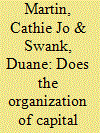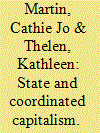| Srl | Item |
| 1 |
ID:
059289


|
|
|
| 2 |
ID:
161963


|
|
|
|
|
| Summary/Abstract |
In light of their nineteenth-century political economies, why did poor, agricultural Denmark become a leader in public, mass primary education (1814) and a multiple-track education system that included vocational training, while rich, industrial Britain did not create public, mass schooling until 1870, and embrace a one-track, academic secondary-education system? The author argues that literary narratives shed light on these cross-national differences. Danish narratives imagined education as social investment for a strong society; diverse educational tracks were necessary to meet the varied skills needs of the economy. British narratives portrayed schooling as essential to self-development and to cultivating the ideal individual. The author uses a close reading of texts and computational linguistics analyses of 521 Danish and 562 British works of fiction from 1700 to 1920 to document the different portrayal of education in the two countries. Case studies show that writers are crucial political actors in important reforms and understudied political agents in policy development stories. The method allows the author to evaluate empirically the complex relationship between culture and political outcomes, to falsify cultural claims, and to improve on thin, vague, national cultural arguments. The article shows how literature helps to reconcile the contradictions embedded in diverse models of governance. Literature provides a site for reworking cultural symbols in response to societal struggles over exogenous change, and provides a source of continuity at moments of institutional change.
|
|
|
|
|
|
|
|
|
|
|
|
|
|
|
|
| 3 |
ID:
064659


|
|
|
| 4 |
ID:
080920


|
|
|
|
|
| Publication |
2007.
|
| Summary/Abstract |
This article investigates the politics of change in coordinated market econo\mies, and explores why some countries (well known for their highly cooperative arrangements) manage to sustain coordination when adjusting to economic transformation, while others fail. the authors argue that the broad category of "coordinated market economies" subsumes different types of cooperative engagement: macrocorporatist forms of coordination are characterized by national-level institutions for fostering cooperation and feature a strong role for the state, while forms of coordination associated with enterprise cooperation more typically occur at the level of sector or regional institutions and are often privately controlled. although these diverse forms of coordination once appeared quite similar and functioned as structural equivalents, they now have radically different capacities for self-adjustment.
The role of the state is at the heart of the divergence among european coordinated countries. a large public sector affects the political dynamics behind collective outcomes, through its impact both on the state's construction of its own policy interests and on private actors' goals. although a large public sector has typically been written off as an inevitable drag on the economy, it can provide state actors with a crucial political tool for shoring up coordination in a postindustrial economy. the authors use the cases of denmark and germany to illustrate how uncontroversially coordinated market economies have evolved along two sharply divergent paths in the past two decades and to reflect on broader questions of stability and change in coordinated market economies. the two countries diverge most acutely with respect to the balance of power between state and society; indeed, the danish state-far from being a constraint on adjustment (a central truism in neoliberal thought)-plays the role of facilitator in economic adjustment, policy change, and continued coordination
|
|
|
|
|
|
|
|
|
|
|
|
|
|
|
|